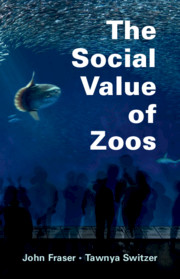Book contents
- The Social Value of Zoos
- The Social Value of Zoos
- Copyright page
- Contents
- Figures
- Tables
- Preface
- Acknowledgments
- Chapter 1 Context
- Chapter 2 Ontology
- Chapter 3 Learning
- Chapter 4 Morality
- Chapter 5 Pleasure
- Chapter 6 Meaning
- Chapter 7 Bonding
- Chapter 8 Connectedness
- Chapter 9 Identity
- Chapter 10 Activation
- Chapter 11 Impact
- Chapter 12 Integration
- References
- Index
Chapter 11 - Impact
Collective Conservation Action
Published online by Cambridge University Press: 26 March 2021
- The Social Value of Zoos
- The Social Value of Zoos
- Copyright page
- Contents
- Figures
- Tables
- Preface
- Acknowledgments
- Chapter 1 Context
- Chapter 2 Ontology
- Chapter 3 Learning
- Chapter 4 Morality
- Chapter 5 Pleasure
- Chapter 6 Meaning
- Chapter 7 Bonding
- Chapter 8 Connectedness
- Chapter 9 Identity
- Chapter 10 Activation
- Chapter 11 Impact
- Chapter 12 Integration
- References
- Index
Summary
Emerging research is now demonstrating that zoos are not hedonic venues for personal fulfillment, but fulfill a more eudaimonic value of self-actualization that exemplifies the personal expressiveness, vitality, and direction zoo users seek as members of a larger community pursuing social change to protect wildlife and natural systems. In Chapter 11, we explore the issue of collective identity theory in the context of zoo experiences, suggesting that zoos have a much more direct value as catalysts for social change than has been reported in the peer-reviewed literature to date. Here, we focus in a fresh way on the zoo movement itself, exploring how complementary and collective work across the sector can produce society-level change – a far departure from the idea of inspiring an individual, through a single zoo visit, to individual-level action that might hopefully add up to something meaningful, at some point. We describe, for example, how a community of practice working across a distributed network of zoos, aquariums, and nature centers has been equipped to deliver coordinated, context-relevant conservation education and messaging to advance a conservation ethic and spark action among potential allies.
Keywords
- Type
- Chapter
- Information
- The Social Value of Zoos , pp. 159 - 179Publisher: Cambridge University PressPrint publication year: 2021

